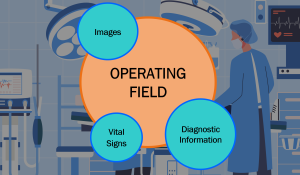
Associate Professor | Acting Undergraduate Program Director | Certified Hybrid Instructor
 Research Interests: Biophotonics, Ultrasound, and Medical Instrumentation
Research Interests: Biophotonics, Ultrasound, and Medical InstrumentationResearch Advancements: Wei-Chiang Lin develops smart intraoperative guidance systems for surgery.
Research Area: Diagnostic Bioimaging Sensor Systems
Lab: Biomedical Engineering Creative Lab: W[CL]2
Website: https://bme.fiu.edu/people/faculty-instructors/wei-chiang-lin/
Biography
Dr. Wei-Chiang Lin is an Associate Professor of the Department of Biomedical Engineering at Florida International University, where he has been since 2004. He served as the interim chair of the Department from 2015 to 2017. Dr. Lin obtained his B.S. degree in Biomedical Engineering from the Chung-Yuan Christian University in Taiwan, ROC in 1987. He received his M.S. and Ph.D. degrees in Biomedical Engineering from the University of Texas at Austin under the supervision of Dr. Ashley J. Welch and Dr. Massoud Motamedi.
When he completed his Ph.D. degree, Dr. Lin received a postdoctoral fellowship (Advisor: Anita Mahadevan-Jansen) from the W. M. Keck Foundation Free Electron Laser Center and joined the Department of Biomedical Engineering at Vanderbilt University in Nashville, TN in 1997. He became a Research Assistant Professor in the Department in 2000.
Dr. Lin’s research focuses on developing engineering solutions for diagnosing and treating tissue disorders and injuries. To date, his research projects have been funded by the National Institute of Health, the Department of Defense, the Thrasher Research Fund, and the American
Research
Dr. Lin’s research involves developing non-destructive optical and mechanical technologies that can detect the signs of disease and tissue injuries in vivo. His previous and current research projects aim to advance the development and implementation of Smart Surgical Environment and Telemedicine. To realize an intelligent surgical environment, Dr. Lin’s research team has been working on tools for (1) real-time, non-destructive tissue diagnosis, (2) wireless monitoring, and (3) information delivery via augmented reality. For the realization of sophisticated telemedicine, Dr. Lin and his team focus on developing sensors for continuous health monitoring.
 |  |
Lab Website
https://facebook.com/biomedeng.creativelab
Current Research Projects
| Project Title | Description | Scientific and Engineering Disciplines Involved |
| Intraoperative Guidance System for Brain Tumor and Epilepsy Surgery | Develop an optical imaging system that performs intraoperative tissue differentiation and hence guides surgery | Biomedical Optics, Instrumentation, Signal Processing, Image Processing, Neurological Surgery |
| Development of Quantitative Optical Ultrasound System | Develop an all-optical ultrasound imaging system to quantify the acoustic/mechanical properties of biological tissues | Ultrasound Physics, Ultrasound Instrumentation, Photoacoustic Theory, Signal Processing, Imaging Processing, Materials Science |
| Wearable/Wireless Sensors for the Real-Time Acquisition of Physiological Signals and Analysis of Movements | Use various wearable and/or wireless sensors to monitor the physiological conditions and activities of the users in order to assess, for example, balance and energy expenditure. | Sensors, Wireless Communication, Physiology, Biomechanics, Biosignal Processing |
| Implantable CO2 Sensor | Develop implantable CO2 sensors to monitor regional CO2 production in vivo. | Sensors, Respiratory Physiology, Biosignal Processing, Biomedical Optics, Biomaterials |
Selected Publications
- Yinchen Song, Sarahy Garcia, Yisel Frometa, Jessica C. Ramella-Roman, Mohammad Soltani, Mohamed Almadi, Jorge J Riera, Wei-Chiang Lin. “Quantitative assessment of hemodynamic and structural characteristics of in vivo brain tissue using total diffuse reflectance spectrum measured in a non-contact fashion”. Biomed. Opt. Express 8, 78-103 (2017).
- Yinchen Song, Jorge J Riera, Sanjiv Bhatia, John Ragheb, Claudia Garcia, Alexander G. Weil, Prasanna Jayakar, Wei-Chiang Lin. “Intraoperative optical mapping of epileptogenic cortices in pediatric patients”. NeuroImage: Clinical, 11, 423-434. 2016.
- Yinchen Song, Rafael A. Torres, Sarahy Garcia, Yisel Frometa, Jihye Bae, Abhay Deshmukh, Wei-Chiang Lin, Ying Zheng, Jorge J Riera. “Dysfunction of Neurovascular/Metabolic Coupling in Chronic Focal Epilepsy”. Biomedical Engineering, IEEE Transactions on 63(1):97-110. 2016.
- Yinchen Song, Basavaraju Sanganahalli, Fahmeed Hyder, Wei-Chiang Lin, Jorge J Riera. “Distributions of irritative zones are related to individual alterations of resting-state networks in focal epilepsy”. PLOS One 10(7): e0134352. 2015.
- Xizi Dai, Yen-Chih Huang, Jared Leichner, Madhvan Nair, Wei-Chiang Lin, Chen-Zhong Li. (2015) Peptide modified polymer poly (glycerol- dodecanedioate co-fumarate) for efficient control of motor neuron differentiation. Biomedical Materials (2015).
- Lin WD, Chang KP, Wang CH, Chen SJ, Fan PC, Weng WC, Lin WC, Tsai Y, Tsai CH, Chou IC, Tsai FJ, ‘Molecular Aspects of Dravet Syndrome Patients in Taiwan,’ Clinica Chimica Acta (2013).
- N Yadav, S Bhatia, J Ragheb, R Mehta, P Jayakar, W Yong , WC Lin, ‘In vivo detection of epileptic brain tissue using static fluorescence and diffuse reflectance spectroscopy,’ Biomed. Opt. 18(2), 027006 (Feb 05, 2013).
- Wang, C., C-YC Huang, and WC Lin. “Optical ATP biosensor for extracellular ATP measurement.” Biosensors and Bioelectronics 43: 355-361 (2013).

